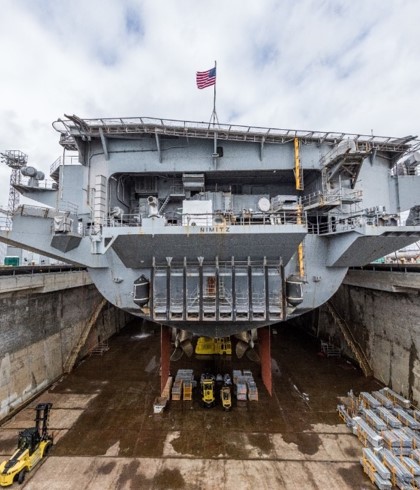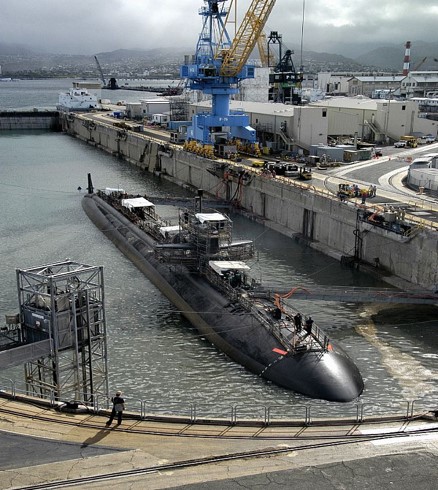LCE Enhances Navy Shipyard Infrastructure Optimization Program (SIOP)
solutions
sectors

LCE Contributes Shipyard Expertise to the U.S. Navy’s Shipyard Infrastructure Optimization Program (SIOP).pdf
Note: This page replaces a previous version that appeared with two images that were not approved for publication. (Updated July 21, 2021)
The Shipyard Infrastructure Optimization Program (SIOP) is a 20-year, $21-billion effort to modernize the U.S. Navy’s four nuclear shipyards in Kittery, Maine; Pearl Harbor, Hawaii; Portsmouth, Virginia; and Bremerton, Washington. These public shipyards – which repair the Navy’s nuclear submarines and aircraft carriers — are aging and facing obsolescence issues. The Navy commissioned a program to create digital twin models of these shipyards to prepare for a multi-billion-dollar optimization overhaul and recapitalization of these critical infrastructure assets.
Ambitious Shipyard Infrastructure Optimization Program Begins with a Pilot Project
The Naval Sea Systems Command (PMS 555) contracted with an industry partner to complete a pilot project to create a foundational digital twin model, simulate the shipyard operations, and define the optimal shipyard plant layout and configuration. The pilot project started with Pearl Harbor Naval Shipyard & Intermediate Maintenance Facility (PHNSY & IMF). PMS 555 sought a user-friendly and cost-effective system to develop, validate, and maintain a digital model of the current shipyard systems, including facilities, equipment, personnel, and work processes, and simulate impacts that workload and system variations have on shipyard Key Performance Parameters (KPPs). The validated model will be used to define and optimize future shipyard plant layouts necessary to execute projected workload and optimize shipyard KPPs.
Scope of the SIOP Pilot Project
The industry partner will provide an accurate digital twin model of critical shipyard repair processes that will enable the user (shipyard, PMS 555, contract team) to run optimization scenarios to identify optimal future layout configurations that provide the greatest gains in efficiency and productivity.
To develop a baseline of the current shipyard maintenance and sustainment processes and capture facility capacity within the current configuration, the industry partner is digitizing the existing infrastructure and processes to create a digital twin of the availability repair processes. This will demonstrate that a digital model can enable the users (shipyards, PMS 555, engineers) to analyze multiple production strategies in relation to the machinery, tools, materials, and labor constraints of the distinct workshops or Homogeneous Technological Areas (HTAs). This analysis makes it possible to optimize each shipyard’s throughput and more easily balance the allocation of materials and capacity across multiple sites.
Using the digital model, the end-user will be able to optimize the future ship-repair processes and physical infrastructure needed to achieve future requirements for a naval capability consistent with U.S. national interests. Because the digital twin models are scenario based, the end user will be able to consider current needs and ensure that construction and enhancements produce minimal disruption to current operations.
LCE Supports the Shipyard Process Data Capture Necessary for Accurate Digital Twin Modeling
In late 2020, the industry partner completed its first digital twin model of Pearl Harbor Naval Shipyard. The team recently finished its baseline digital model at Puget Sound Naval Shipyard and will soon begin an analysis for its industrial optimization. Meanwhile, data collection recently wrapped up in January 2021 at Portsmouth Naval Shipyard, and the partner is in the initial stage of data collection and model development at Norfolk Naval Shipyard.
Life Cycle Engineering (LCE) helps lead the process capture portion of the digital twin. LCE is the on-site partner, supporting the team by providing Subject Matter Experts (SMEs) with recognized experience in shipyard maintenance processes as well as ship repair operations. To get the ground-up perspective on what both current execution entails, and how future execution can be streamlined, LCE SMEs developed comprehensive questionnaires and facilitated in-person interviews with hundreds of current shipyard employees across nearly all individual shops and codes. LCE  continues to work with shipyard management and other SIOP industry partners to obtain critically needed information as well as working with other SIOP industry partners to clarify shipyard operations and terminology, which are crucial to digital modeling efforts.
continues to work with shipyard management and other SIOP industry partners to obtain critically needed information as well as working with other SIOP industry partners to clarify shipyard operations and terminology, which are crucial to digital modeling efforts.
As the lead on-site industry partner at Pearl Harbor Naval Shipyard gathering data over the past year, LCE has identified both the repair processes and the industrial equipment required to accomplish production work, whether at the waterfront or in the production shops, and has worked with the digital modelers to build out the 6D portion of the digital twin models.
As the digital twin models are completed, each shipyard will identify and run optimization scenarios that will determine the best arrangement of shipyard facilities to support current and future repair availabilities and physical infrastructure layout. The results of these optimization runs will form the basis of each shipyard’s Area Development Plan (ADP), which will be a team effort between the industry partners, shipyards and PMS 555, and are the next step in the Shipyard Infrastructure Optimization Program.
“The modeling and simulation is really key as it allows us the opportunity to figure out how to optimize flow, not only within the shops, but around the yards to provide the most efficient and productive layout for operations within the shipyard.”
– Stephanie Douglas, Executive Director for Logistics, Maintenance and Industrial Operations at Naval Sea Systems Command.
“There has never been a digital twin modeling-and-simulation effort of this size and scale ever in the world.”
– Steve Lagana, PMS 555, Program Manager for SIOP.

To learn more about LCE’s Shipyard Planning and Engineering Process Support,
please visit our website

